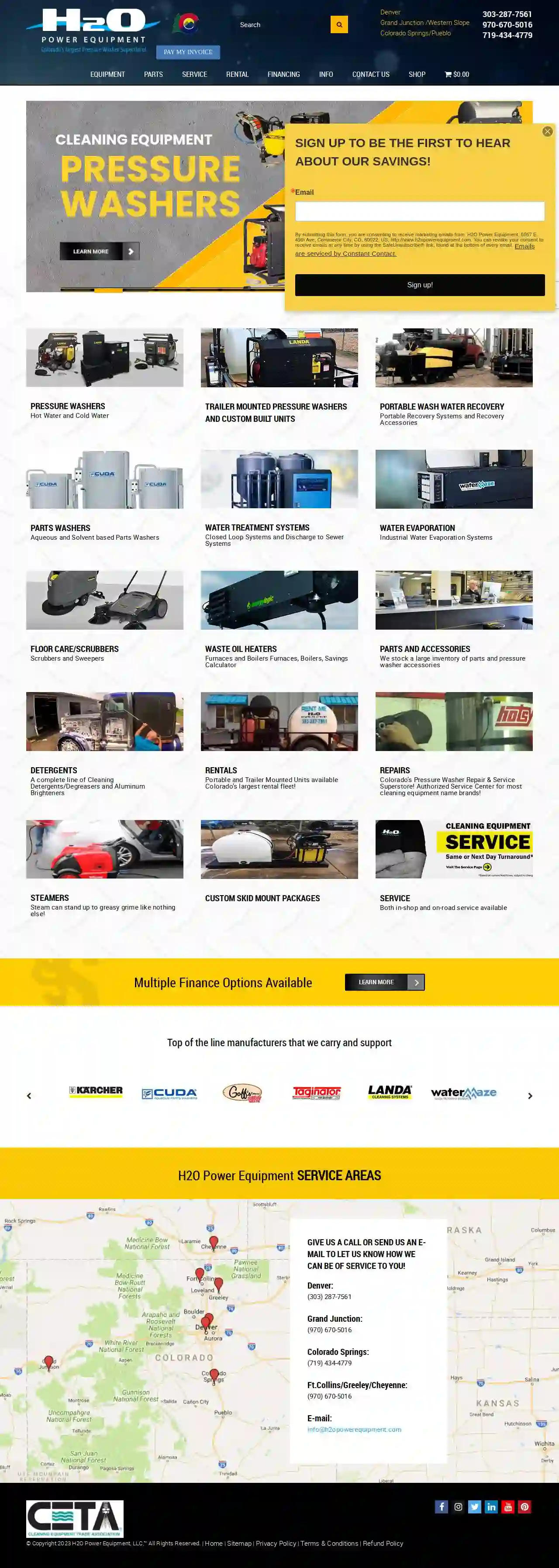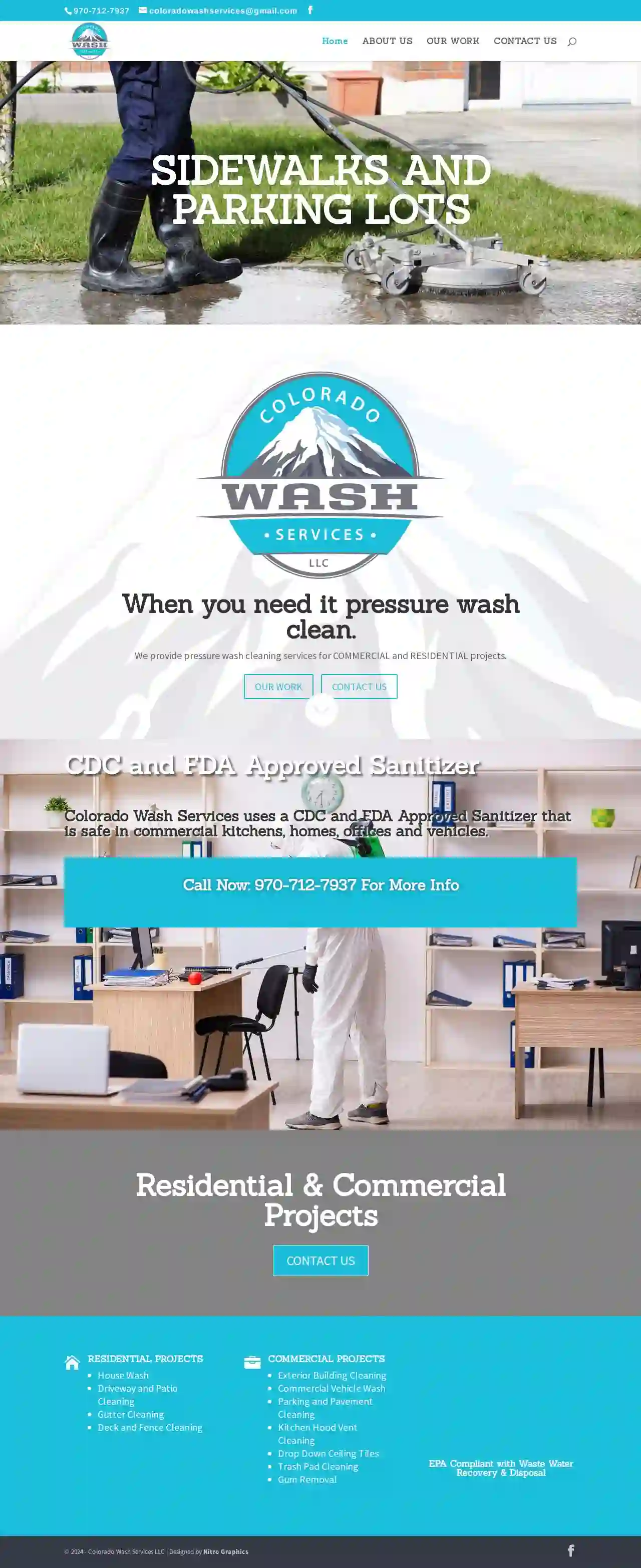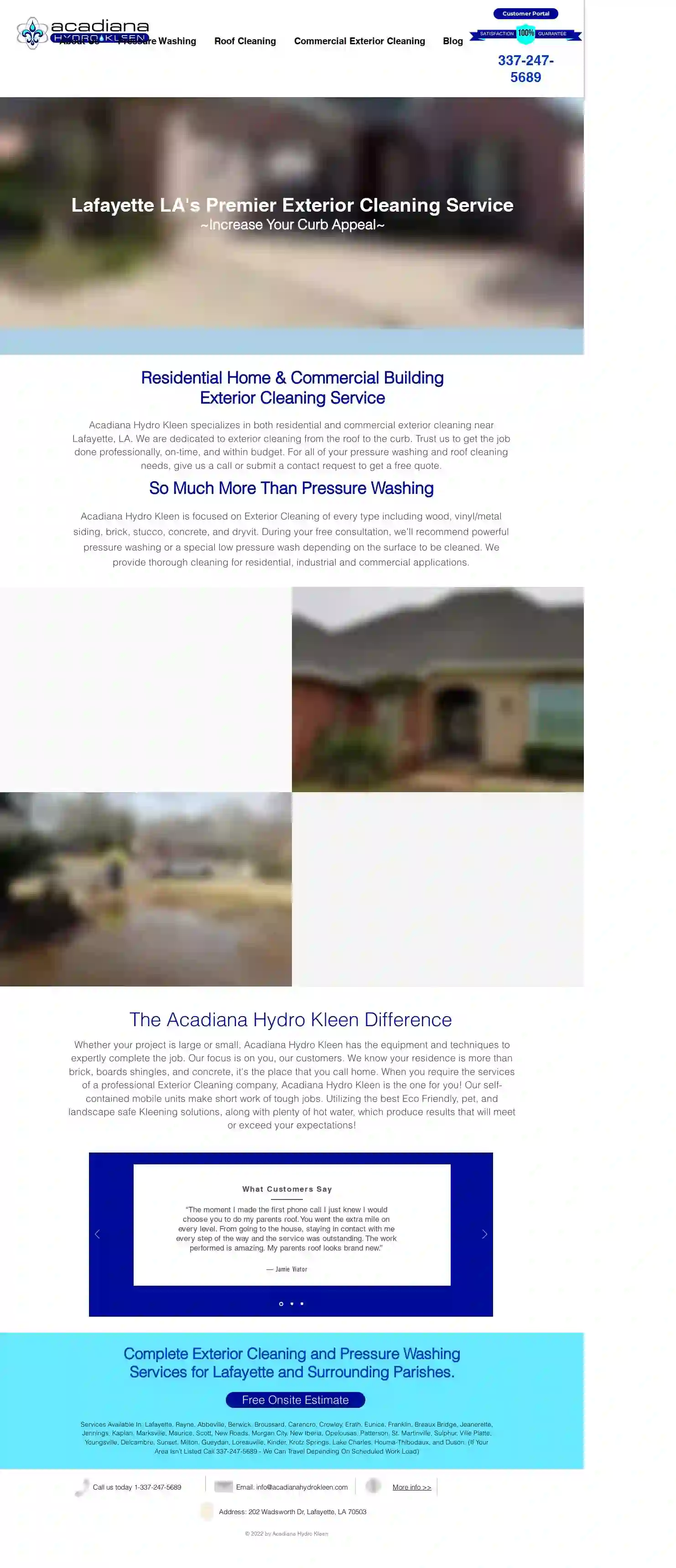Pressure Washing El Jebel
Find the best Pressure Washing in El Jebel
Get up to 3 Exterior Cleaning quotes for your project today! Compare profiles, reviews, accreditations, portfolio, etc... and choose the best offer.

Aqua Wash
4.960 reviews35547 Devon Dr., Slidell, 70460, USAqua Wash is a professional pressure washing and soft washing company serving the New Orleans and Northshore areas. We offer a comprehensive lineup of high-quality exterior cleaning services designed to fit just about any pressure washing need you might have around your home. With our high-quality roof washing, soft washing, and house washing services, there's no surface around your home that our team of skilled professionals can't help you return to its original, immaculate state. We understand that your home is likely one of the most significant investments you'll ever make, and as such, you want to do everything in your power to protect your investment and keep it looking great for you and your family. When it comes to maintaining the beauty of your New Orleans home, pressure washing and soft washing are two of the most useful tools you can have in your arsenal, and here at Aqua Wash, we are the skilled pros you can trust to help you get the job done right.
- Services
- Why Us?
- Testimonials
- Gallery
Get Quote
H2O Power Equipment
4.7201 reviewsDenver, 14011, USH2O Power Equipment is your one-stop shop for all your pressure washing needs. We offer a wide variety of hot water and cold water pressure washers, as well as trailers and custom installs. We also carry a full line of parts and accessories, including detergents, burners, coils, couplers, fittings, filters, electrical components, engines, motors, pulleys, guns, wands, lances, hoses, reels, nozzles, pumps, pump kits, unloaders, injectors, valves, and gauges. We offer both in-shop and on-road service, and we are an authorized service center for most cleaning equipment name brands. We also offer rentals, financing, and combatting invasive species solutions.
- Services
- Why Us?
- Gallery
Get Quote
Colorado Pressure Washing Services, LLC
123 Main St, Suite 100, Denver, 80202, USAt Colorado Pressure Washing Services LLC, we understand the value of a pristine and impressive exterior. Whether it's a sprawling mansion, a historic residence, or a luxurious villa, our team, equipped with the best in the industry from Landa, is dedicated to making your property radiate unparalleled elegance and charm.
- Services
- Why Us?
- Accreditations
- Our Team
- Testimonials
- Gallery
Get Quote
Colorado Wash Services
54 reviews970-712-7937, 970, USWhen you need it pressure wash clean. We provide pressure wash cleaning services for COMMERCIAL and RESIDENTIAL projects.
- Services
- Why Us?
- Accreditations
- Gallery
Get Quote
Pressure Washing Lafayette
202 Wadsworth Dr, Lafayette, 70503, USAcadiana Hydro Kleen is Lafayette, LA's premier exterior cleaning service, dedicated to providing professional pressure washing and roof cleaning solutions for both residential and commercial properties. We specialize in a wide range of exterior cleaning services, including wood, vinyl/metal siding, brick, stucco, concrete, and dryvit. Our team utilizes powerful pressure washing or specialized low-pressure washing techniques depending on the surface, ensuring thorough and effective cleaning for all applications. We pride ourselves on our commitment to customer satisfaction, offering free onsite estimates and utilizing eco-friendly, pet, and landscape-safe cleaning solutions. Whether your project is large or small, Acadiana Hydro Kleen has the expertise and equipment to deliver exceptional results.
- Services
- Why Us?
- Testimonials
- Gallery
Get Quote
Pali Pressure Pros
520 reviewsLafayette, USThe Best Pressure Washing Service In New Orleans, Metairie, Kenner, Gretna, Harvey, Timberlane, Terrytown, Belle Chasse, Marrero, and Westwego. We here at Pali Pressure Pros offer efficient, reliable pressure washing services to help keep your home or business looking great! We always love to serve our community here in Louisiana all the way from Kenner to Belle Chasse and everywhere in between. We understand that there are a lot of options out there and it can be overwhelming. How could it not be? This is your home, a sacred vessel that you love. We understand this immensely, and that's why our team makes sure to take very special care of every home that we visit. Whether we are cleaning your house's siding, roof, driveway, or just a fence we take the utmost care and use only the best and safest cleaning techniques. We offer residential and commercial pressure washing services to clean your homes, driveways, sidewalks, decks, patios, and more. With a combination of our pressure washing equipment and eco-friendly cleaning solutions we clean, restore, and protect all the surfaces of your home or business. Let us take care of your pressure washing needs and let your property shine!
- Services
- Why Us?
- Gallery
Get Quote
Accelerated Pressure Cleaning LLC
531 reviews414 SUMMERFEST DR, Lafayette, 70507, USAccelerated Pressure Cleaning is a locally owned business serving Lafayette, Carencro, Broussard, and surrounding areas in Louisiana. With over 13 years of experience, they specialize in professional pressure washing and soft washing services for residential properties. Their team is dedicated to providing quality and professional services, ensuring customer satisfaction. They understand the importance of maintaining a clean and grime-free property and offer a range of services to meet client needs, including pressure washing, soft washing, roof washing, wood fence/deck restoration, and rust removal. Accelerated Pressure Cleaning prides itself on using environmentally friendly methods and providing free, accurate estimates.
- Services
- Why Us?
- Gallery
Get Quote
Venturini's Pressure Washing & Surface Cleaning
544 reviewsLafayette, USLocal. Family Owned. Trusted. Professional exterior cleaning services Elevate your property's allure with our unmatched exterior cleaning and restoration solutions, ensuring pristine surfaces and lasting brilliance. Get a quote Give us a call Our Services How Can We Help You? Venturini's Pressure Washing & Surface Cleaning offers a comprehensive range of expert exterior cleaning and restoration services. From powerful pressure washing to delicate house and roof washing, as well as specialized services like paver sealing and wood restoration, we ensure exceptional results for both residential and commercial properties.
- Services
- Why Us?
- Gallery
Get Quote
Power Washing Pros
517 reviewsThibodaux, LA, 2572 Talbot Ave, 70301, USPower Washing Pros LLC is a trusted name in pressure washing services in Thibodaux, providing high-quality and affordable services to residential and commercial properties. With 10 years of experience and OSHA 50 certification, they offer a wide variety of services including building washing, commercial pressure washing, deck & fence cleaning, and more. Their commitment to customer satisfaction and dedication to improving the aesthetics and durability of homes and businesses in Southern Louisiana sets them apart.
- Services
- Why Us?
- Accreditations
- Our Team
- Testimonials
- Gallery
Get Quote
Bayou Boys Soft Washing LLC
51 reviewsLafayette, LA, PO Box 51752, 70505, USBayou Boys Soft Washing is a local business offering professional soft washing services in the Acadiana area. They provide a variety of services including pressure washing, soft washing, gutter maintenance, sidewalk maintenance cleaning, and more. Their team is experienced, insured, and reliable, and they offer contracts for their services. They cater to both residential and commercial properties and are ready to tackle any cleaning job.
- Services
- Why Us?
- Our Team
- Testimonials
- Gallery
Get Quote
Over 60,241+ Janitorial Companies on our platform
Our cleaning companies operate in El Jebel and surrounding areas!
CleaningMatch has curated and vetted the Best Cleaning Contractors near El Jebel. Find a trustworthy business today.
Frequently Asked Questions About Pressure Washing
- Pressure Washing: Suitable for hard surfaces like concrete, brick, stone, and decks that can withstand high pressure. Effective for removing stubborn dirt, grime, and stains.
- Soft Washing: Best for delicate surfaces like roofs, siding, painted surfaces, and wood fences that may be damaged by high pressure. Effective for removing mold, mildew, algae, and other contaminants without causing harm.
- Size of the Area: Larger areas generally cost more to pressure wash than smaller ones.
- Type of Surface: Different surfaces require different pressure levels and cleaning solutions, which can affect pricing.
- Condition of the Surface: Heavily soiled or stained surfaces may require more time and effort to clean, impacting cost.
- Accessibility: Difficult-to-reach areas may require specialized equipment and increase costs.
- Additional Services: Services like pre-treating stains, applying protective coatings, or mold removal may incur additional charges.
- Enhanced Curb Appeal: Pressure washing removes dirt, grime, and stains, instantly revitalizing the appearance of your property and boosting curb appeal.
- Improved Health and Safety: Pressure washing removes mold, mildew, algae, and other contaminants that can pose health risks and create slippery surfaces.
- Increased Property Value: A well-maintained exterior, achieved through regular pressure washing, can increase the value of your property.
- Preventative Maintenance: Pressure washing removes dirt and grime that can deteriorate surfaces over time, extending the lifespan of your driveway, deck, fence, and other exterior features.
- Preparation for Painting or Staining: Pressure washing is an essential step before painting or staining, as it provides a clean and receptive surface for the new coating to adhere to.
How do I know if I need pressure washing or soft washing?
If you're unsure which method is best for your surfaces, consult with a professional pressure washing company. They can assess your needs and recommend the most appropriate cleaning method.
How much does pressure washing cost?
To get accurate pricing, request quotes from multiple pressure washing companies. Provide details about the size and type of surface, its condition, and any additional services you require.
What are the benefits of pressure washing?
Whether you're looking to improve your property's appearance, protect its value, or enhance health and safety, pressure washing is a valuable investment.
What is the difference between pressure washing and soft washing?
Pressure washing uses high-pressure water spray to blast away dirt, grime, and other stubborn contaminants from hard surfaces. It's effective for cleaning driveways, decks, patios, fences, and siding.
Soft washing utilizes low-pressure water combined with specialized cleaning solutions to gently remove dirt, mold, mildew, and algae from delicate surfaces like roofs, siding, and painted surfaces. Soft washing is less abrasive than pressure washing, preventing damage to sensitive materials.
Choosing the appropriate cleaning method depends on the type of surface, its condition, and the desired cleaning outcome. Consult with a professional pressure washing company to determine the best approach for your specific needs.
How do I know if I need pressure washing or soft washing?
- Pressure Washing: Suitable for hard surfaces like concrete, brick, stone, and decks that can withstand high pressure. Effective for removing stubborn dirt, grime, and stains.
- Soft Washing: Best for delicate surfaces like roofs, siding, painted surfaces, and wood fences that may be damaged by high pressure. Effective for removing mold, mildew, algae, and other contaminants without causing harm.
If you're unsure which method is best for your surfaces, consult with a professional pressure washing company. They can assess your needs and recommend the most appropriate cleaning method.
How much does pressure washing cost?
- Size of the Area: Larger areas generally cost more to pressure wash than smaller ones.
- Type of Surface: Different surfaces require different pressure levels and cleaning solutions, which can affect pricing.
- Condition of the Surface: Heavily soiled or stained surfaces may require more time and effort to clean, impacting cost.
- Accessibility: Difficult-to-reach areas may require specialized equipment and increase costs.
- Additional Services: Services like pre-treating stains, applying protective coatings, or mold removal may incur additional charges.
To get accurate pricing, request quotes from multiple pressure washing companies. Provide details about the size and type of surface, its condition, and any additional services you require.
What are the benefits of pressure washing?
- Enhanced Curb Appeal: Pressure washing removes dirt, grime, and stains, instantly revitalizing the appearance of your property and boosting curb appeal.
- Improved Health and Safety: Pressure washing removes mold, mildew, algae, and other contaminants that can pose health risks and create slippery surfaces.
- Increased Property Value: A well-maintained exterior, achieved through regular pressure washing, can increase the value of your property.
- Preventative Maintenance: Pressure washing removes dirt and grime that can deteriorate surfaces over time, extending the lifespan of your driveway, deck, fence, and other exterior features.
- Preparation for Painting or Staining: Pressure washing is an essential step before painting or staining, as it provides a clean and receptive surface for the new coating to adhere to.
Whether you're looking to improve your property's appearance, protect its value, or enhance health and safety, pressure washing is a valuable investment.
What is the difference between pressure washing and soft washing?
Pressure washing uses high-pressure water spray to blast away dirt, grime, and other stubborn contaminants from hard surfaces. It's effective for cleaning driveways, decks, patios, fences, and siding.
Soft washing utilizes low-pressure water combined with specialized cleaning solutions to gently remove dirt, mold, mildew, and algae from delicate surfaces like roofs, siding, and painted surfaces. Soft washing is less abrasive than pressure washing, preventing damage to sensitive materials.
Choosing the appropriate cleaning method depends on the type of surface, its condition, and the desired cleaning outcome. Consult with a professional pressure washing company to determine the best approach for your specific needs.